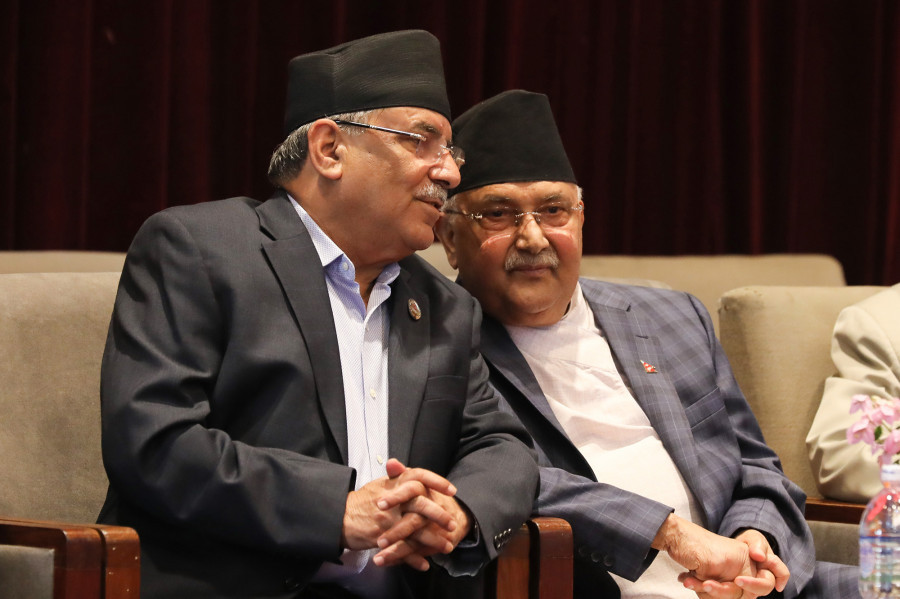Politics
Oli and Dahal agreeing to resume Standing Committee is a small step towards resolution, party insiders say
There are indications that both sides are slowly edging towards a solution to the party crisis with the Dahal faction tempering its demands and Oli agreeing to the Standing Committee.
Tika R Pradhan
As the exercise continues to try to find a solution to the crisis within the ruling Nepal Communist Party, the two party chairs have decided to resume the ongoing Standing Committee, a positive step towards a compromise, say party insiders.
Oli and Dahal met on Tuesday for around two hours at Baluwatar in the afternoon. This was their second one-on-one meeting since Dahal called for Oli’s resignation, precipitating the crisis.
“Though the two leaders agreed to continue one-to-one talks, no progress has been made yet. However, they have agreed to continue with the Standing Committee meeting scheduled for Wednesday,” said Bishnu Sapkota, Dahal’s press adviser.
After Dahal and a number of senior leaders demanded Oli’s resignation on June 30 as both party chair and prime minister, Oli, on July 2, prorogued the House, sparking fears of a party split. The ongoing Standing Committee meeting, which was where the call for resignation was made, was subsequently stalled. Second-rung leaders had urged the top leadership to only call a Standing Committee meeting after issues were resolved between the two chairs.
“Agreeing to hold the Standing Committee indicates that Oli is perhaps ready to face the meeting,” said Mani Thapa, a Standing Committee member who is close to Dahal.
But insiders say that the Oli faction could use the Standing Committee to launch their own attack on the opposing factions. As of now, around 30 of the Standing Committee’s 44 members have called for Oli’s resignation.
Although details are scant about what occured in Tuesday’s closed-door meeting, leaders from the Dahal camp believe that he is working to prevent a party split.
“It is not clear what transpired during today’s meeting but it is clear that the party won’t split now,” said Haribol Gajurel, a Standing Committee member who is close to Dahal.
According to Gajurel, a potential offer on the table is the creation of a ‘mechanism’ within the party to work alongside the government and guide its actions. One of the primary complaints from the Dahal and Madhav Nepal factions in the ruling party has been that Oli acts unilaterally, without consulting with the party he represents.
The mechanism would include Madhav Kumar Nepal and perhaps also Jhala Nath Khanal and Bamdev Gautam—all senior leaders who’ve allied with Dahal. This would go some ways towards assuaging their concerns of having been sidelined and not listened to, say party leaders.
“Managing the respectable positions for Dahal and Nepal is the only way to patch up the differences in the party, at least for sometime,” said Shyam Shrestha, a political analyst.
But leaders from the Dahal-Nepal faction have also tempered their demands and are now saying that they will accept the resignation from just one post.
“Our demand was that Oli should resign as both party chair and prime minister but things have become more difficult now,” said Raghuji Pant, a Standing Committee member from the Nepal faction. “Our bottom line now is that he must quit as prime minister.”
The change in stance comes after proposals going back and forth between the opposing factions mentioned giving continuity to a November 19 deal between Oli and Dahal during a previous bout of party tensions. The deal was that Dahal would become executive chair and exercise more authority in the party while Oli would continue for the full five-year term as prime minister. That deal never really came into implementation, as Oli refused to cede power in either sphere to Dahal.
According to Shrestha, Oli has refused the suggestions of his own people that he should step down as prime minister rather than party chair as he could lose his grip on the party. But party leaders had told the Post on Monday that while Oli is adamant on not resigning from either post, he could consider taking a more “ceremonial” role in the party, as per the November 19 agreement.
“I think Oli could have agreed to relinquish one of the two positions if the Dahal-Nepal faction had raised the issue properly,” said Thapa, the Standing Committee member. “But now, he seems to have strengthened his position by proroguing the House.”
Party leaders from the Nepal and Dahal camp say that Oli’s autocratic streak has caused more problems than resolved them but there are some who also believe that this is not the right time for an internal party crisis, especially given the Covid-19 pandemic. Many second-rung leaders have now started to push for reconciliation.
“We have been demanding that the top leaders reconcile,” said Energy Minister Barsaman Pun, also a Standing Committee member. “We [second-rung leaders] have been meeting regularly to discuss ways to support the two chairs in their bid to find an amicable solution to this crisis.”




 17.12°C Kathmandu
17.12°C Kathmandu















